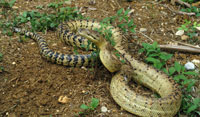The Reptile Nation's mission for herp education and conservation.
Click image to enlarge  Jamaican Yellow Boa, Epicrates subflavus. Jamaican Yellow Boa, Epicrates subflavus. |
Over the past 40 years, the occurrence of reptiles and amphibians (herps) in captivity has steadily increased. The numbers of herps are increasing; the variety and diversity of herps successfully maintained is increasing; the numbers of participating keepers also are increasing. Today it is statistically probable that within the circle of friends, relatives and acquaintances of every citizen of the United States there are people who maintain reptiles and amphibians.
During this period of time there have been extraordinary advances regarding successful husbandry and propagation techniques of herps. Hundreds of species of herps have been bred in captivity. Today the majority of herps maintained in captivity in this country are produced from captive breeding.
All levels of herp keeping, from the casual owner of a single reptile or amphibian to the incorporated businesses that annually propagate tens of thousands of herps, are today recognized as the Reptile Industry … or Reptile Nation. This multi-faceted heterogeneous conglomeration of interests and businesses annually contributes many millions of dollars to the economy.
A growing awareness of the general public to the numbers of herps in captivity has generated an unprecedented acceptance of, and interest in, reptiles. Reptiles are increasingly visible in television, movies and advertising. The majority of pet stores in the United States now feature reptiles and equipment, food and dry goods marketed for reptiles. The reptile exhibits in zoos are typically among the most visited areas of that zoo.
While individuals and regional herpetological organizations have made laudable efforts to provide information and education about herps both in nature and in captivity, neither a nationally organized program to provide information and education to the general public, nor any attempt to lobby to the governmental agencies and legislative bodies that regulate such activities, have been undertaken. At the same time, at the national level, there is a vocal and increasingly organized attempt by the Animal Rights Movement to arrange and create a perceived need for what amounts to the banishment of all animals in captivity – reptiles in particular.
The United States Association of Reptile Keepers (USARK) believes that every attempt be made to inform and educate the public and involved government agencies about the importance and value of reptile keeping, herpetoculture, and the value and importance of the existence of viable self-sustaining captive populations of reptiles. Thus, the initial aims of the Science and Research initiative of USARK are two-fold.
Education: First and foremost, USARK will strive to advance the current understanding regarding topics that may threaten the Reptile Industry. USARK recognizes that education is a fundamental issue for our industry survival.
Certainly there remains among the general population a segment with generally unfavorable views of reptiles – old beliefs and prejudices die hard – and a larger segment with unformed opinions. We believe that is it of paramount importance to design and implement proactive measures to communicate with this demographic. It’s not a matter of educating the public about reptiles, rather it is a matter of educating the public about the existence and activities of the Reptile Industry. We need to provide a positive and realistic profile of the Reptile Industry to the public at large and to regulatory governmental agencies.
It is equally important that we be able to react to the various attacks that will be mounted against the Reptile Industry. For example, in early 2008 tremendous media attention was directed to the release of a spurious report issued by USGS biologists stating that the Burmese python population in the Everglades would spread throughout the southern third of the continental United States. The media found few sources that could provide any critical analysis of this false and suspect claim.
In similar future circumstances, USARK must be prepared and positioned to quickly disseminate information that both illustrates and interprets biased and false reports and information. USARK must position itself as a source of information to where both the media and the public can turn to for non-sensational interpretation of events.
Conservation: It is paramount that conservation becomes a hallmark of the Reptile Industry. On national and local fronts, USARK must support the establishment of strategies aimed at preventing the decline of native herp species. USARK must cooperate, and when necessary coordinate, with local, state and federal conservation agencies on herpetological matters.
In light of the stark reality of worldwide extreme habitat loss, accelerating environmental disturbance and degradation, and a loss of both species diversity and density, captivity is increasingly viewed by conservationists as an acceptable and appropriate conservation measure for many species. Implemented examples include the captive programs for many Asian turtle species and the AZA supported Amphibian Ark program.
USARK needs to stress that each of the hundreds of herp species currently maintained in viable, self-sustaining captive populations by the Reptile Industry represents an excellent model for a successful, non-governmental, decentralized, economically driven, conservation project. USARK must stress that with the support of the Reptile Industry, there are few herp species that cannot be successfully maintained in perpetuity in captivity.
At this time, the Reptile Industry is the most successful and experienced entity in the world at managing and maintaining an entire order of vertebrate animals.
In the future: We realize that USARK will be required to address other issues. With this in mind, we realize that cooperation between ourselves, government agencies, the scientific community and the private sector is essential for the long-term viability of our hobby.
Andrew Wyatt is the President of the United States Association of Reptile Keepers (USARK) and has been an avid herp enthusiast for more than 35 years. He has traveled the world and has had his animals featured in a number of television productions. For more information about USARK, click here .


